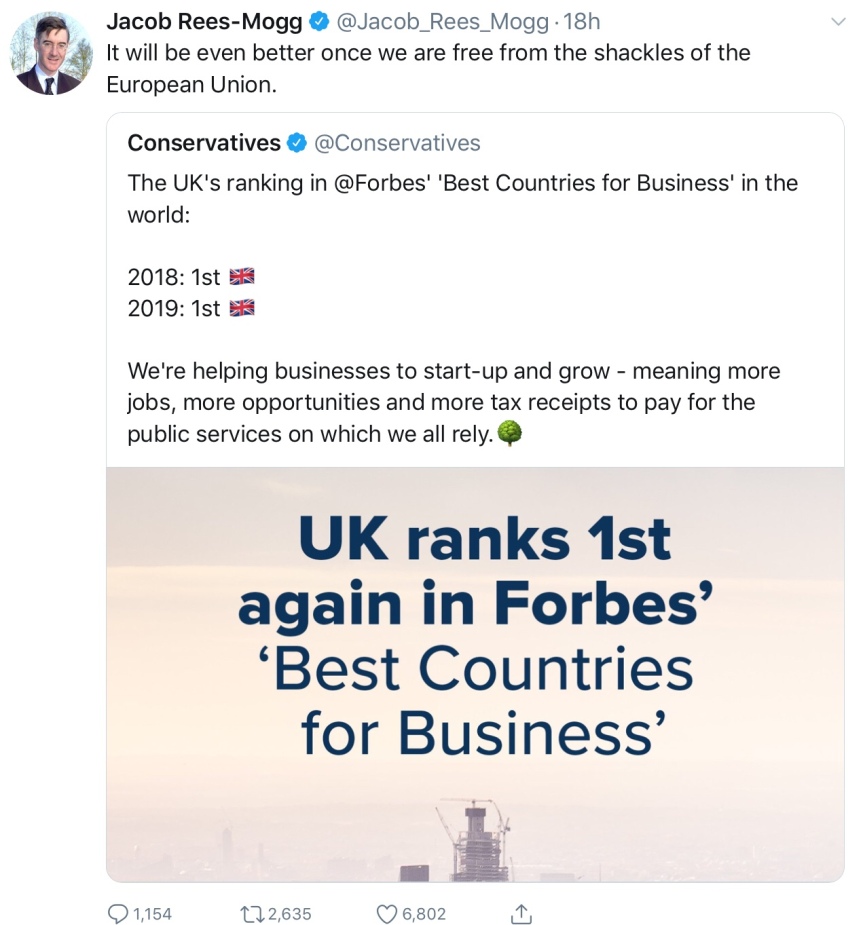Yesterday Jacob Rees-Mogg demonstrated one of the key techniques of ‘fake news’ – not once, but twice – and at the same time showed quite how difficult it will be to do anything meaningful to address ‘fake news’. Most of the attempts to address ‘fake news’ have centred on the most obvious symptoms – items that are individually and specifically ‘faked’, or accounts specifically designed to distribute this kind of fake news. Jacob Rees-Mogg’s actions yesterday did not involve either of those. Rather, it took ‘real’ news from reputable sources, deliberately misinterpreted it, using the headlines in a way they were not intended, to help weave a fake narrative. Just as fake, even more damaging, and much harder to fight.
Here is the first:

The source is impeccable: the Irish Examiner, a reputable newspaper, quoting the Irish PM, the Taoiseach. And yet the interpretation by Rees-Mogg is almost entirely fake. The article does not say what Rees-Mogg says at all – this is how it quotes Varadkar in the text:

If you look at the detail of the piece, the nuance comes out. Varadkar says that no hard border will be required the moment of no deal, because up until that point there will be a de-facto alignment of customs, but the moment there is divergence a border will be required. That does not mean that no deal means no need for the backstop: precisely the opposite. It is exactly why a backstop is required: to be ready for this divergence, should it be about to happen.
Could Rees-Mogg be interpreting the piece incorrectly in error? Or is it deliberate, assuming that most of his followers won’t even bother reading the piece and will take his summary as the truth. The number of retweets and likes suggests that this last part – the acceptance of his interpretation – is at least true. As for his intentions, that, ultimately, is a matter for him. The second example, however, makes it harder to maintain the ‘innocent error’ explanation…

This time a not-quite-so-impeccable source – the Conservative Party – but quoting a much more reliable source, Forbes. Again, the headline all makes sense, but again Rees-Mogg’s interpretation goes directly against the content of the piece (which can be found here) from which the Conservative Party drew its conclusions:

Again, this is pretty much precisely the opposite of Rees-Mogg’s interpretation. Forbes are not saying that the UK will be even better outside the EU – but that being in the EU is one of the reasons that the UK has done well, and why this is highly unlikely to continue once we leave (let alone if we leave without a deal).
In both cases, the sources are good, but they are being used to spread a narrative that is essentially false. In both cases, as can be seen by the retweets and likes, this false narrative is being spread enthusiastically by Rees-Mogg’s followers. In neither case would any of the methods currently proposed for dealing with ‘fake news’ make the slightest difference to what has been done.
There are some lessons to be learned. The Irish Examiner should have been more careful about its tweet – the wording left it open for misinterpretation and misquotation. The rest of the media should be more critical and sceptical about politicians – Rees-Mogg needs to be challenged in every interview when he says things like this, as do politicians of all sides talking on all subjects. The only real weapon that we have against ‘fake news’, whether the directly fake or the fake narratives spread by Rees-Mogg and many more on both left and right (and indeed in the centre) is real news and a properly critical and sceptical media that focuses as much on accuracy as their own interpretation of impartiality.
Do I expect any of this to happen? Not really. The media has largely failed us in recent years, particularly over Brexit, and I don’t think there is much sign of it changing. It is too important, however, to just give up. We need to become cleverer, more ‘savvy’, more ‘media literate’, and keep fighting. That’s all there is left.
Thanks to @StevePeers and @DeclanButlerNat for pointing out the second story. You can find some of my academic work on fake news in my new book, The Internet, Warts and All, Free Speech, Privacy and Truth, and in my even newer piece on the role of Facebook, in the Northern Ireland Legal Quarterly, available online (and open access) here.

Thank you… This explains nicely and factually. As you say, many people just read the headlines… Never bothering to delve into contextual facts…
Reblogged this on sdbast.
The award winning Jacob Rees-Mogg!
Sounds impressive until you learn that those awards are The Last Leg, Dick of the Year and The New European Podcast, Worst Brexiteer of the Year.
just leaving this here
Thanks – Joanna Cherry is on the ball as usual!
Quite right, I would have ‘liked’ your comment but there’s no ‘like’ button!
You need to sort your inverted commas out. You are accusing J R Mogg of using “so called” fake news when surely you mean he is actually faking the news.
Not really. It’s the definition of fake news that’s questionable.
Would be worth including the link to the Forbes piece – https://www.forbes.com/places/united-kingdom/
Thanks – will do.
For hottest news you have to visit web and on the
web I found this website as a finest web page for latest updates.